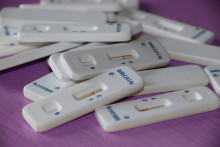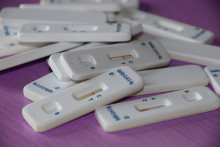The two scientists, currently working at the University of Melbourne, have published a study which estimates that a three-month delay in cancer diagnosis and treatment due to COVID-19 will result in 90 additional deaths and $12 million in additional healthcare costs over 5 years in Australia. ‘And the numbers may be higher in the Netherlands, because corona has been more impactful there compared to Australia,’ points out IJzerman.
Decline in (diagnosed) cases
The study was triggered by data from the Netherlands. ‘We collaborate with the National Cancer Registry and soon after the pandemic started, we saw a huge decline in cancer incidence,’ says the professor. ‘This doesn’t mean there are less people with cancer. It is a sign that those with cancer go undiagnosed.’
This delay in diagnosis and treatment negatively impacts the patients’ outcome, explains Degeling. ‘During the period of delay, the cancer can progress to a more advanced stage and thereby the survival chances decrease. The disease also becomes more costly to treat, as advanced stages of cancer are often treated using more expensive drugs. Because of all this, we wanted to get an early estimate of the impact of the corona crisis on cancer patients.’
‘Don’t just wait until after the pandemic is over’
By revealing the possible consequences, the researchers wanted to show how lifting ‘corona’ restrictions could help the situation. ‘The Ministry of Health in Australia has flagged these and other findings and they are now encouraging people to see their doctors. Don’t just wait until after the pandemic is over,’ says IJzerman. ‘Seeing your GP and referral to the hospital is critical.’
350 deaths and $46 million
The study by Degeling and IJzerman focused only on Australia, but they have since launched an online tool that allows scientists anywhere in the world to produce the same estimates. ‘If you have data about the disease and distribution of patients, you can use the model to calculate the impact of delay in care,’ explains Degeling. ‘With the model, you can look into different scenarios and see what happens with certain delays.’ To illustrate, the study suggests that a six-month delay in cancer diagnosis and treatment would result in about 350 deaths and cost the Australian healthcare system $46 million.
The researchers will continue to focus on the collateral damage of COVID-19 for the time being. ‘Once we have real-time data, we want to make more detailed estimates of the long-term impact,’ says IJzerman. ‘We are also collaborating with Oxford University on project into ethical implications of COVID-19 care. It is exploring the question of how much effort should be put into treatment of COVID-19 if other consequences can be even more severe than coronavirus related deaths.’
maarten ijzerman and koen degeling
Maarten IJzerman is a full professor in the department of Health Technology and Services Research at the University of Twente and head of Cancer Health Services Research in the University of Melbourne, Australia. He is co-chairing the data-driven cancer health services research hub for his research on improving dynamic treatment pathways for cancer patients.
Koen Degeling is an alumnus of the University of Twente, where he obtained Bachelor and Master degrees in Industrial Engineering and Management. He also did his doctoral research at the UT and graduated (cum laude) in 2019, after which he joined the Cancer Health Services Research Unit (University of Melbourne) as a Research Fellow. He focuses on the use of simulation models to evaluate and optimize clinical pathways and improve patient outcomes.







